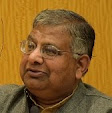Prolog
It’s not clear what’s our identity as a human being and to
whom we should be accountable. We are
born in a certain family and at a certain location. For a long time, we get nurtured by the
family we are born with and we develop attachment to the area that we grew up
in. So we develop an emotional identity
to make us feel at “home” at a setting that attracts us and lets us meet our
friends with whom we had childhood association.
A child has a smaller world, and hence most experiences etch in child’s
memory. Through enabling the revisit of the memory amidst friendly associates,
we feel child-like again. Possibly the
child in us never grows up and the ado and the power we display later are
plainly vain and trivial. Living and laughing as a child is the greatest
blessing a human being can ask for in life.
While growing up in small town Cuttack, I had another aspect
to my life not easily available to many.
My father would hide in low
thatched huts in paddy fields a few miles from our home and I would have to
struggle to figure a face inside the overflowing beard. Little did I know that this is a sacrifice
people do to build a nation in order to give rights to human beings. My mother, dainty she was, was right in ally
with this drama. Then meetings would
happen, flowers would be thrown, songs would be sung and father would be home
for a few months until the next episode began.
I am not sure who controlled these episodes and why my father was
volunteering for this adventure, I never asked.
All in the family and all in the neighborhood loved him and I loved him
too. Not many in similar situations had
a family or a son. A son to my father
became my identity.
When I learned to read and could read newspapers, I learned
that I had certain rights by virtue of the language I spoke. I would go with my mother or an uncle to the
sand bed of Kathjodi river to hear some
of the most prolific speeches made in my language. I loved the fluency; I loved the sincerity of
each of the speakers. Good language is
nectar to a young person of seven years of age.
I saw that with my children, I see that with my granddaughter who just
crossed six years of age. Language is
curiosity, it creates imagination. Seven
is the connecting age to the universe.
The sonority of the speech however would not bring father to dinner at
home, but to a jail cell somewhere. The
boy’s life gets confused again with a missing father. Meetings would continue; others would speak; protests
would proliferate till someone died through a police gun shot. These were rebellion days in the new-born
democracy, each group asserting identity, asking for security. It’s
not clear if the person volunteered to die or was a bystander. A sacrifice brings results; Orissa got most
of its demands in the new demarcation.
This forms my identity as a human being with the added
responsibility of what I do with it.
Does it help me or hurt me? Do I
have a choice? Should I not feel happy
at a place which accepts me? Why do I go
anywhere else? Is it to feed myself or
to evaluate my identity? Do I compete in
the world or do I feel happy to survive?
Do I exploit my identity or do I nurture it? Do I have a duty towards the people who gave
me my identity? Do I have a duty for
that boy who died in creating my identity?
Questions come, but I always suppressed them. Life doesn’t allow us to answer
questions. Many times we pretend not to
know them. Life creates situations and
doesn’t give us enough intelligence to sort out. Most often we get tired and die before having
an opportunity to look back at life.
Many times life looks ugly and we try to forget the past. Rarely, we gather courage to observe our
traced path and check what’s left. By the time we think of our teachers, most
are dead. The design of the universe is
not one of gratitude but that of survival.
A slight instability and you lose your ground. Most look at the ground and possibly five
feet around. To look at a tree is a rare
privilege indeed!
If you keep a thought in mind, opportunity shows up. So was the summer of 2012. I lost my father in 2000 and my mother in
2009. I had to observe my personal
family to determine if they forgave me for my less than adequate dutifulness over
the years. I had to gather the spiritual
energy in me to look back at the boy of seven in those Kathjodi sands. I had to extrapolate the enthusiasm that
created my identity some fifty five years ago.
I had to meet hundreds of my brothers, sisters and friends. I have to connect my world to theirs. I have seen it before, but always constrained
with the issues of the family and the problems associated with them. Most from the Kathjodi sands have disappeared
or live the last days somewhere in quiet.
We celebrate my father locally to claim that we didn’t forget. We don’t have courage to bring all together. We think somebody else would do, nobody
does. First time ever I visit with unconstrained
open eyes. I want to see, visit, hug,
sing and dance. I want to become a boy
of seven. I begin my journey on a Virgin
Atlantic flight from Boston en route to London.
Bijoy Misra
July 14, 2012
Lincoln, MA.
…
To continue.

No comments:
Post a Comment